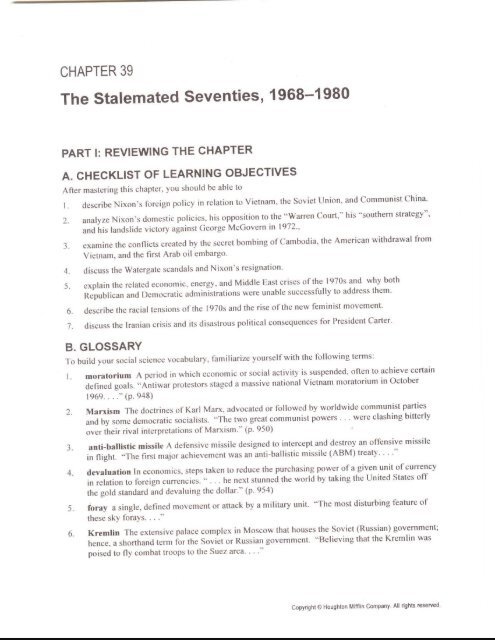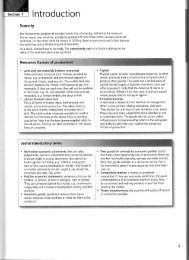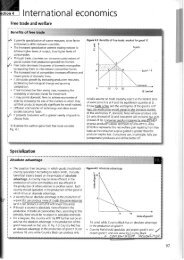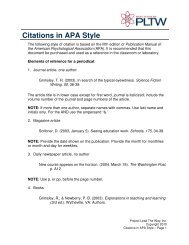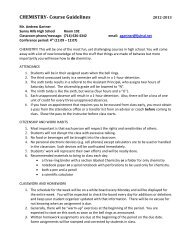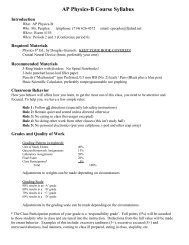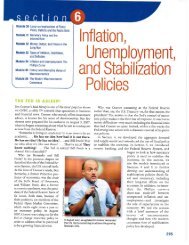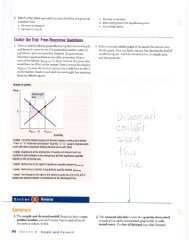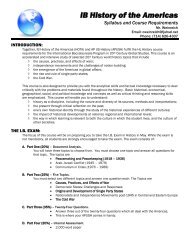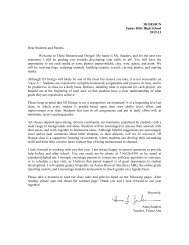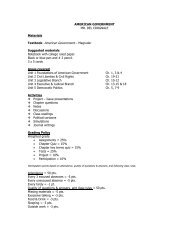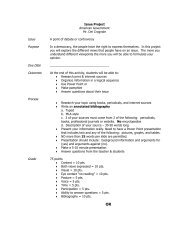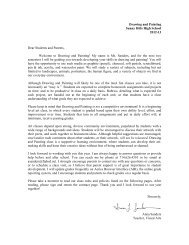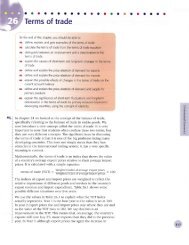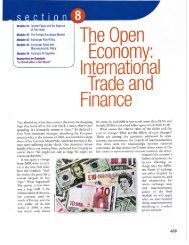The Stalemated Seventies, 1968-1980 - Sunny Hills High School
The Stalemated Seventies, 1968-1980 - Sunny Hills High School
The Stalemated Seventies, 1968-1980 - Sunny Hills High School
You also want an ePaper? Increase the reach of your titles
YUMPU automatically turns print PDFs into web optimized ePapers that Google loves.
CHAPTER 39<br />
<strong>The</strong> <strong>Stalemated</strong> <strong>Seventies</strong>, <strong>1968</strong>-<strong>1980</strong><br />
PART I: REVIEWING THE CHAPTER<br />
A. CHECKLIST OF LEARNING OBJECTIVES<br />
After mastering this chapter, you should be able to<br />
I. describe Nixon's foreign policy in relation to Vietnam, the Soviet Union, and Communist China.<br />
2. analyze Nixon's domestic policies. his opposition to the "Warren Court," his "southern strategy",<br />
and his landslide victory against George McGovern in 1972.,<br />
3. examine the conflicts created by the secret bombing of Cambodia, the American withdrawal from<br />
Vietnam, and the first Arab oil embargo.<br />
4. discuss the Watergate scandals and Nixon's resignation.<br />
5. explain the related economic. energy. and Middle East crises of the 1970s and why both<br />
Republican and Democratic administrations were unable successfully to address them.<br />
6. describe the racial tensions of the 1970s and the rise of the new feminist movement.<br />
7. discuss the Iranian crisis and its disastrous political consequences for President Carter.<br />
B.GLOSSARY<br />
To build your social science vocabulary, familiarize yourself with the following terms:<br />
I. moratorium A period in which economic or social activity is suspended, often to achieve certain<br />
defined goals. "Antiwar protestors staged a massive national Vietnam moratorium in October<br />
1969...." (p. 948)<br />
2. Marxism <strong>The</strong> doctrines of Karl Marx, advocated or followed by worldwide communist parties<br />
and by some democratic socialists. "<strong>The</strong> two great communist powers ... were clashing bitterly<br />
over their rival interpretations of Marxism." (p. 950)<br />
3. anti-ballistic missile A defensive missile designed to intercept and destroy an offensive missile<br />
in flight. "<strong>The</strong> first major achievement was an anti-ballistic missile (ABM) treaty...."<br />
4. devaluation In economics, steps taken to reduce the purchasing power of a given unit of currency<br />
in relation to foreign currencies. " ... he next stunned the world by taking the United States ofT<br />
the gold standard and devaluing the dollar." (p. 954)<br />
5. foray a single, defined movement or attack by a military unit. "<strong>The</strong> most disturbing feature of<br />
these sky forays...."<br />
6. Kremlin <strong>The</strong> extensive palace complex in Moscow that houses the Soviet (Russian) government;<br />
hence, a shorthand term for the Soviet or Russian government. "Believing that the Kremlin was<br />
poised to fly combat troops to the Suez area...."<br />
Copynght © Houghton Mifflin Company. All rights reserved.
Chapter 39: <strong>The</strong> <strong>Stalemated</strong> <strong>Seventies</strong>, <strong>1968</strong>-<strong>1980</strong> 353<br />
7. attorney general <strong>The</strong> presidentially appointed head of the Department of Justice and chief legal<br />
officer ofthe federal government. "... firing his own special prosecutor ... as well as his<br />
attorney general and deputy attorney general. ..."<br />
8. executive privilege In American government, the claim that certain information known to the<br />
president or the executive branch of government should be unavailable to Congress or the courts<br />
because of the principle ofseparation of powers. " ... the Supreme Court unanimously ruled that<br />
"executive privilege" gave him no right to withhold evidence...."<br />
9. recession A moderate and short-term economic downturn, less severe than a depression.<br />
(Economists define a recession as two consecutive quarters, i.e., six months, of declining gross<br />
domestic product.) "Lines ofautomobiles at service stations lengthened as tempers shortened and<br />
a business recession deepened." (p. 958)<br />
10. born-again <strong>The</strong> evangelical Christian belief in a spiritual renewal or rebirth, involving a personal<br />
experience ofconversion and a commitment to moral transformation. "... this born-again Baptist<br />
touched many people with his down-home sincerity." (p. 967)<br />
II. balance of payments <strong>The</strong> net ratio, expressed as a positive or negative sum, ofa nation's exports<br />
in relation to its imports. (It may be calculated in relation to one particular foreign nation, or to all<br />
foreign states collectively.) "<strong>The</strong> soaring bill for imported oil plunged America's balance of<br />
payments deeply into the red...." (p. 971)<br />
12. Commando Member ofa small, elite military force trained to carry out difficult missions, often<br />
within territory controlled by the enemy. "A highly trained commando team penetrated deep into<br />
Iran's sandy interior."<br />
PART II: CHECKING YOUR PROGRESS<br />
A. True-False<br />
Where the statement is true, circle T; where it is false, circle F.<br />
I. T F<br />
2. T F<br />
3. T F<br />
4. T F<br />
5. T F<br />
6. T F<br />
7. T F<br />
8. T F<br />
Nixon's "Vietnamization" policy sought to bring an immediate negotiated end to the<br />
Vietnam War.<br />
Nixon's 1970 invasion ofCambodia provoked strong domestic protests and political<br />
clashes between "hawks" and "doves."<br />
Nixon's and Kissinger's diplomacy attempted to play the Soviet Union and China off<br />
against each other for America's benefit.<br />
Nixon attempted to reverse what he saw as the Warren Supreme Court's excessive turn<br />
toward "judicial activism."<br />
Nixon consistently opposed the expansion ofsocial-security and pro-environmental<br />
legislation.<br />
<strong>The</strong> basic issue in the 1972 Nixon-McGovern campaign was innation and the<br />
management ofthe economy.<br />
<strong>The</strong> 1973 Paris agreement on Vietnam provided for a cease-fire and American<br />
withdrawal but did not really end the civil war among the Vietnamese.<br />
<strong>The</strong> strongest charge against Nixon during Watergate was that he had used government<br />
agencies to burglarize and harass opponents and cover up the Watergate crimes.<br />
Copyright C Houghton Mifflin Company. All rights reserved.
354 Chapter 39: <strong>The</strong> <strong>Stalemated</strong> <strong>Seventies</strong>, <strong>1968</strong>-<strong>1980</strong><br />
9. T F<br />
10. T F<br />
II. T F<br />
12. T F<br />
13. T F<br />
14. T F<br />
15. T F<br />
<strong>The</strong> disclosure ofthe secrel bombing ofCambodia led Congress to acknowledge Ihe<br />
president's sole authority to take military action in defense of America's national<br />
security.<br />
<strong>The</strong> 1973 Arab-Israeli War and OPEC oil embargo added to the inflation that began in<br />
the wake of the Vietnam War.<br />
Republican leaders in Congress strenuously opposed Nixon's resignation and urged<br />
him to fight to stay in office even after the Watergate tapes were released.<br />
President Gerald Ford immediately set out to reverse the ixon-Kissinger policy of<br />
detente toward the Soviet Union.<br />
<strong>The</strong> women's movement achieved success in the 1970s by allying itself with the rising<br />
antiwar and black power movements ofthe decade.<br />
President Carter's declaration that America's problems were due to a "moral and<br />
spiritual crisis' led the public to support his proposals to decrease dependency on<br />
Middle Eastern oil.<br />
<strong>The</strong> Iranian revolution against the shah brought the United States into a confrontation<br />
with the new, militant Muslim leaders of the country.<br />
B. Multiple Choice<br />
Select the best answer and circle the corresponding letter.<br />
I. A primary cause of the economic decline that began in the 1970s was<br />
3. an international trade war.<br />
b. a rise in the price of agricultural goods.<br />
c. the breakup of efficient American companies.<br />
d. a decline in worker productivity<br />
2. <strong>The</strong> severe inflation ofthe 1970s was largely caused by<br />
a. Lyndon Johnson's effort to maintain the Vietnam War and the Great Society programs<br />
without raising taxes.<br />
b. Nixon's deeision to devalue the dollar and take the U.S. off the gold standard.<br />
c. the higher prices for scarce natural resources like iron. coal. and lumber.<br />
d. the strong demands of unionized workers for substantial wage inereases.<br />
3. President Nixon's "Vietnamization" policy provided that<br />
a. the United States would accept a unified but neutral Vietnam.<br />
b. the United States would escalate the war in Vietnam but withdraw from Cambodia and Laos.<br />
c. the United States would gradually withdraw ground troops while supporting the South<br />
Vietnamese war effort.<br />
d. the United States would seek a negotiated settlement of the war.<br />
4. <strong>The</strong> antiwar movement expanded dramatically in 1970 when<br />
a. the massacre ofcivilians at My Lai by some U.S. soldiers was revealed.<br />
b. Nixon ordered further bombing of North Vietnam.<br />
c. the communist Vietnamese staged their Tet Offensive against American forces.<br />
d. Nixon ordered an invasion of Cambodia.<br />
5. Nixon attempted to pressure the Soviet Union into making diplomatic deals with the United States<br />
by<br />
a. playing the "China card" by opening U.S. diplomacy and trade with the Soviets' rival<br />
communist power.<br />
b. using American economic aid as an incentive for the Soviets.<br />
Copyrighll!:l Houghton Mifflin Company. AU rights reserved.
-----------------------_.-- -<br />
356 Chapter 39: <strong>The</strong> <strong>Stalemated</strong> <strong>Seventies</strong>, <strong>1968</strong>-<strong>1980</strong><br />
14. President Carter's greatest success in foreign policy was<br />
a. handling the Arab oil embargo and the energy crisis.<br />
b. negotiating successful new agreements with the Soviet Union.<br />
c. negotiating the Camp David peace treaty between Israel and Egypt.<br />
d. maintaining peace and stability in Central America.<br />
IS. President Carter's greatest problem in foreign policy was<br />
a. the Panama Canal issue.<br />
b. the Soviet invasion of Afghanistan.<br />
c. the continuing Arab-Israeli confrontation.<br />
d. the Iranian seizure of American hostages.<br />
C. Identification<br />
Supply the correct identification for each numbered description.<br />
1.<br />
Nixon's policy of withdrawing American troops from Vietnam while providing<br />
aid for the South Vietnamese to fight the war<br />
2.<br />
<strong>The</strong> Ohio university where four students were killed during protests against the<br />
1970 invasion of Cambodia<br />
3.<br />
Top-secret documents, published by <strong>The</strong> New York Times in 1971, that showed<br />
the blunders and deceptions that led the United States into the Vietnam War<br />
4.<br />
5.<br />
6.<br />
7.<br />
8.<br />
9.<br />
10.<br />
11.<br />
12.<br />
13.<br />
14.<br />
<strong>The</strong> first major achievement of the Nixon-Kissinger detente with the Soviet<br />
Union, which led to restrictions on defensive missile systems<br />
Nixon's plan to win reelection by curbing the Supreme Court'sjudicial activism<br />
and soil-pedaling civil rights<br />
Term for the new group affirmative action policy promoted by the Nixon<br />
adm in istration<br />
A Washington office complex that became a symbol ofthe widespread<br />
corruption ofthe Nixon administration<br />
<strong>The</strong> law, passed in reaction to the secret Cambodia bombing, that restricted<br />
presidential use of troops overseas without congressional authorization<br />
Arab-sponsored restriction on energy exports after the 1973 Arab-Israeli war<br />
Nixon-Ford-Kissinger policy ofseeking relaxed tensions with the Soviet Union<br />
through trade and arms limitation<br />
International agreement of 1975, signed by President Ford, that settled postwar<br />
European boundaries and attempted to guarantee human rights in Eastern<br />
Europe<br />
Proposed constitutional amendment promoting women's rights that fell short of<br />
ratification<br />
Supreme Court decision that declared women's right to choose abortion.<br />
Two historic sites seized by American Indian activists in 1970-1972 to draw<br />
public attention to Indian grievances<br />
Copyright Cl Houghton Mifflin Company. All rights reserved.
15.<br />
Chapter 39: <strong>The</strong> <strong>Stalemated</strong> <strong>Seventies</strong>, <strong>1968</strong>-<strong>1980</strong> 357<br />
Provision of the 1972 Education Amendments that prohibited gender<br />
discrimination and opened sports and other arenas to women<br />
D. Matching People, Places, and Events<br />
Match the person, place, or event in the left column with the proper description in the right column by<br />
inserting the correct letter on the blank line.<br />
I. Richard Nixon<br />
2. Spiro Agnew<br />
3. Rachel Carson<br />
4. Daniel Ellsberg<br />
5. Henry Kissinger<br />
6. Earl Warren<br />
7. George McGovern<br />
8. Sam Ervin<br />
9. Gerald Ford<br />
10. John Dean<br />
II. James Earl Carter<br />
12. Anwar Sadat<br />
13. Allen Bakke<br />
14. Shah of Iran<br />
15. Ayatollah Ruhollah Khomeini<br />
Copyright C Houghton Mifflin Company. All rights reserved.<br />
a. <strong>The</strong> Muslim religious leader who<br />
dominated the 1979 Iranian revolution<br />
b. <strong>The</strong> first appointed vice president and<br />
first appointed president ofthe United<br />
States<br />
c. Supreme Court justice whose "judicial<br />
activism" came under increasing attack<br />
by conservatives<br />
d. Nixon's tough-talking conservative<br />
vice president, who was forced to<br />
resign in 1973 for taking bribes and<br />
kickbacks<br />
e. Talented diplomatic negotiator and<br />
leading architect ofdetente with the<br />
Soviet Union during the Nixon and<br />
Ford administrations<br />
f. Egyptian leader who signed the Camp<br />
David accords with Israel<br />
g. California medical school applicant<br />
whose case led a divided Supreme<br />
Court to uphold limited forms of<br />
affirmative action for minorities<br />
h. Environmental writer whose book<br />
Silent Spring helped encourage laws<br />
like the Clean Water Act and the<br />
Endangered Species Act<br />
I. South Dakota senator whose antiwar<br />
campaign was swamped by Nixon<br />
J. Former Georgia governor whose<br />
presidency was plagued by economic<br />
difficulties and a crisis in Iran<br />
k. Former Pentagon official who "leaked"<br />
the Pentagon Papers<br />
I. Winner of an overwhelming electoral<br />
victory who was forced from office by<br />
the threat of impeachment<br />
m. White House lawyer whose dramatic<br />
charges against Nixon were val idated
8.<br />
9.<br />
10.<br />
words ordering the<br />
Watergate cover-up<br />
<strong>The</strong> communist<br />
Vietnamese offensive in<br />
1975<br />
<strong>The</strong> Soviet invasion of<br />
Afghanistan<br />
<strong>The</strong> 1979 revolution in<br />
Iran<br />
G. Developing Historical Skills<br />
Understanding Political Cartoons<br />
f.<br />
g.<br />
h.<br />
Chapter 39: <strong>The</strong> <strong>Stalemated</strong> <strong>Seventies</strong>, <strong>1968</strong>-<strong>1980</strong> 359<br />
Brought about a cease-fire and the<br />
withdrawal of American troops<br />
from Vietnam in 1973<br />
Caused protests on U.S. campuses<br />
and congressional attempts to<br />
restrain presidential war powers<br />
Brought an era of relaxed<br />
international tensions and new<br />
trade agreements<br />
'- Caused the collapse of South<br />
Vietnam and the flight of many<br />
refugees to the United States<br />
J. Proved the president's guilt and<br />
forced him to resign or be<br />
impeached<br />
<strong>The</strong> more controversial a major political figure, the more likely he or she is to be the subject of political<br />
cartoons. Richard Nixon was such a controversial figure, and the cartoons in this chapter show several<br />
views ofhim. Answer the following questions:<br />
I. What is the view of Nixon's diplomacy in the cartoon Balancing Act on p. 951? What is the<br />
significance ofhis unusual "balance bar"?<br />
2. In the cartoon ofNixon, the Law and Order Man on p. 960, what aspect ofNixon's earlier career<br />
is satirized? What details suggest the cartoonist's view ofNixon's Watergate strategy?<br />
3. In the cartoon How Long Will Nixon Haunt the GOP on p. 960, what is the cartoonist suggesting<br />
about Ford's pardon ofNixon? What alleged quality ofNixon's is common to both this cartoon<br />
and the previous one on Nixon, the Law and Order Man?<br />
4. In the cartoon Who Lost Vietnam on p. 962, Nixon is satirized, but less harshly than in the other<br />
cartoons. What changes the perspective on him here?<br />
Copyright ©Houghton Mifflin Company. All rights reserved.


